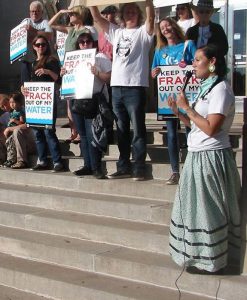
Oklahoma’s efforts to target environmental protesters at pipelines and other energy projects are being copied in numerous other states.
Witness the success of the new law in putting an end to efforts of Native American protesters to stage a Dakota Access Pipeline style demonstration at the Diamond Pipeline that was completed last year. The law carried prison time and a hefty fine for those who interfered or jeopardized energy projects in the state and stopped activist Ashley McCray and others in their tracks.
“That was really pretty successful in thwarting a lot of our efforts to continue any activism after that,” McCray said in an interview with Inside Climate News.
In January 2017, she and others vowed to block the $900 million Diamond pipeline that now carries oil from the Cushing hub to Memphis, Tennessee.
“I’m here standing before you today to say ‘enough is enough—indigenous people cannot be treated this week any more. Black communities cannot be treated this way any more.’ This is a clear cut case of environmental racism,” charged McCray as reported by
OK Energy Today in January 2017.
She and other Native American activists vowed to create a rural encampment similar to the one in North Dakota. Days later, the Oklahoma legislature considered a bill carrying 10 years in prison and up to $1 million in penalties for groups that were part of a conspiracy to violate the law. It was passed and signed into law.
As the legislature dealt with the law, McCray and others established a camp they called Oka Lawa which was soon monitored closely by agents of the U.S. Department of Homeland Security and local law officers. FBI agents also arrived on the scene. The camp eventually was disbanded.
Now McCray is running for the Oklahoma Corporation Commission, trying to take the more traditional approach of environmental and energy activism.







